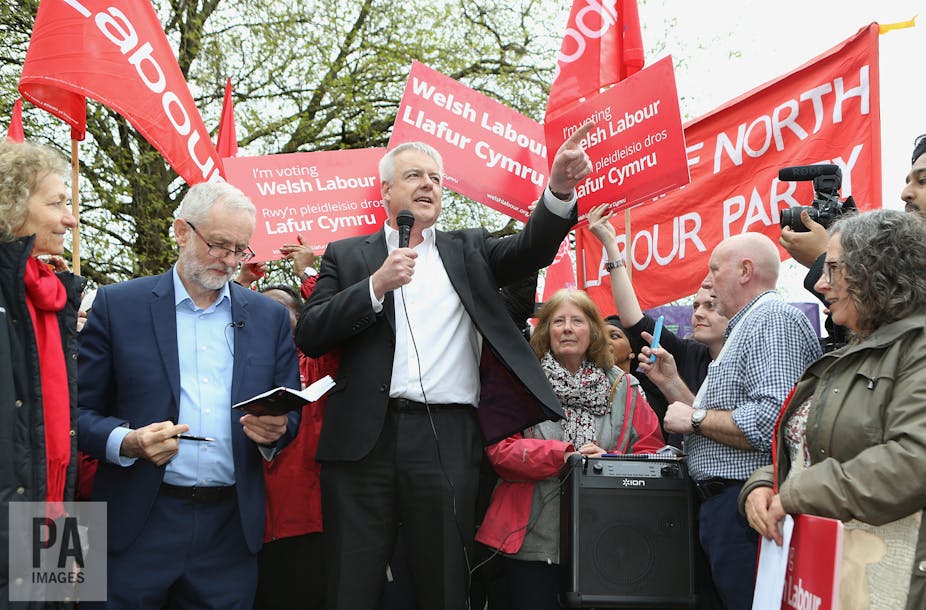It’s been more than a fortnight since the story broke of a general election poll for Wales so sensational that even the British press sat up and paid attention – and the buzz has yet to die down.
The poll, conducted by Cardiff University’s Wales Governance Centre working with YouGov and ITV, found that the Conservative Party could be heading for an election landslide in what is traditionally regarded a Labour heartland. A second poll released this week shows that although there has been an upturn in Labour support, the Conservatives are still on track for a majority in Wales – their first since the Victorian era.
Lack of more consistent analysis, combined with a deficit in Welsh media, has resulted in less meaningful discussion than one might hope – both with respect to the conditions that led to this projection and the possible implications for Wales and its people. But while it may fit the narrative of the London media to apportion blame for the poll to the Labour leader, Jeremy Corbyn, the truth is more complex. For one thing the latest figures for Labour in Wales are not in themselves hugely dramatic and are consistent with recent levels of support.
It is the 12-13% rise in the Tory vote accompanied by a 7-8% drop in UKIP’s support that are most significant features of these polls. These numbers have led some to suggest that Labour’s worst fears have been confirmed: the faithful are being led to the Tories through the populist right.
Welsh landscape
This change in voting patterns is not a short story – it reflects Welsh societal changes that have been taking place for some years now: demographic shifts, economic upheaval, inward and outward migration – and changes in belief represent a Wales that exhibits less of the certainties of old.
Indeed, it feels at times as if the current political malaise represents something approaching the spiritual collapse anticipated by philosopher JR Jones back in the 1960s. Jones warned that the decline of a genuine nonconformist spirit of protest could lead to a dramatic political collapse in Wales. The rise of UKIP with their elected Welsh Assembly Members, and their appeasement in the Senedd, and now potential Conservative success speaks of such a crisis for the Labour Party.
When the regime of profit comes to a point where it can no longer be doctored, it shall easily fall upon us that we are facing a new period of fascist counter-revolution.
In summary, he believed that worsening living conditions brought about through unfettered capitalism, combined with the softening of a moral core, would sap the strength to withstand such a movement. While Jones wrote from the Christian perspective this softening he speaks of has without doubt occurred in the Welsh Labour movement.
Party of Wales
So what can be done to “save” Wales? In previous years many of the core Plaid Cymru – the nationalist party of Wales – vote would have welcomed the Labour dominance being broken. But now I have seen some party members suggest that this would be a pyrrhic victory in a Wales where the Conservatives have a sizeable popular mandate, supported by a partisan English press.

Though they have refused to work in an official coalition in the recent past – Labour has so far dismissed any talk of backroom deals with other parties in this election too – an unofficial anti-Tory alliance between Plaid and Labour could be the answer here for the progressive left.
Given current projections, it looks like the best Welsh Labour could hope for is another progressive coalition with Plaid in the devolved Welsh Assembly elections of 2021 – with a referendum on further powers and even independence likely to be part of the deal. This rerun of the relatively successful 2007 One Wales coalition would probably be welcomed in the quarters of Welsh Labour that are far less unionist than its Scottish counterpart.
And there is a good basis for it to happen, given the current compact between the two progressive parties, which was also the basis for a joint white paper on Brexit. This cooperation reflects Welsh Labour’s readiness to embrace a more Welsh, devolutionist agenda that makes Plaid a natural partner – evident once again in their move to distance themselves from the Parliamentary Labour Party in this election campaign.
In the face of whatever the next four years hold, the prospect of moving towards further powers would be especially welcome for many in the Labour ranks. Given that the stakes are so high, Labour faces the possibility of a genuine existential crisis for the people and communities that the party represents – an overworn phrase in recent times, but depressingly applicable in this context.
This election is a battle to protect the progressive heart of the Welsh body politic. And Labour should contemplate whether it might be better to take a quicker route towards necessary alliances and reforms now, rather than face a potentially bleak future.

